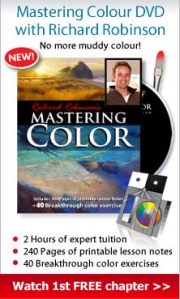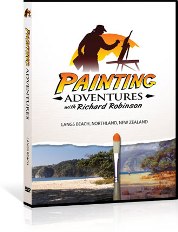Oil Painting Tips | Painting Articles(Scroll down to see the full list of lessons in this section)
Here’s a list of oil painting tips that you might find helpful when you’re still starting out. They are things that many painters have found useful throughout the years (maybe because they had to learn the hard way about them). Try to remember these things as you paint, because it will save you a lot of hassle. 1. Try to dry your painting in the light as much as possible Oil paintings take months and months to dry completely, and it’s inevitable that some of that time will be in the dark. But when paintings dry in the dark, sometimes oils rise up to the surface which can create a yellow film over the top of your work. Make sure you dry your painting in the light whenever possible, which can reverse this effect. 2. Organize your palette When you lay out paints on your palette, it’s helpful to always keep the same colors in the same area. This way, you’ll be able to reach for the color in the right location out of habit and won’t waste time searching for it on your palette. It will become second nature. 3. Don’t skimp on brushes Don’t even think about using synthetic brushes. They simply won’t do for oil painting. Most oil painters use hog’s hair brushes. You wouldn’t want something you worked so hard on to be ruined by bristles falling out of an inadequate synthetic brush—don’t buy them. 4. Take care of your brushes Brushes are expensive, but if you take proper care of them they can last a very long time. During a session, you can use paper to roughly wipe excess paint from a brush if you want to use it with a different color. But when you’re done using a brush, clean it out thoroughly with turpentine and let it dry. 5. Removing stuck paint caps The caps on your paints will surely get stuck from time to time if you’re not using the paint frequently. There are many methods for getting them off, so try a few and take your pick. Many artists keep a pair of pliers with the rest of their art supplies and use these to hold the cap steady while they spin the tube (or to spin the cap while they hold the tube steady). Other artists don’t like the damage this might do to the caps, so they use small flat pieces of rubber to get a firm grip on the cap instead. Additionally, soaking the cap area in hot water for a bit usually loosens it up. If you don’t want it to happen again in the future, make sure to clean off all the dried paint and rub a little vaseline around the edges before closing it again. 6. Interesting methods to preserve paints You’re not going to finish a painting in one sitting, and that means your already mixed colors need to be saved for next time. One of the most popular paint-saving tips is to cover and freeze the entire palette. Another is to use a glass palette and store the paints underwater. It seems a little crazy, but it works! If you follow these six oil painting tips, creating great paintings should be significantly easier. In this section of our website, we had specially prepared other useful oil painting articles with useful tips that one would require to gain a better understanding of mastering oil painting. Do check them out below...
List of Oil Painting Tips & Acrylic Painting Tips:
Oil Painting Tips | Painting Articles | Acrylic Painting Tips | ||
|


Master the Colours DVD...

|
Although every attempt has been made to make information as accurate as possible, we are not responsible for any errors that may appear.
© Copyright 2015, OilPaintingTechniquesLessons.com. All Rights Reserved.





